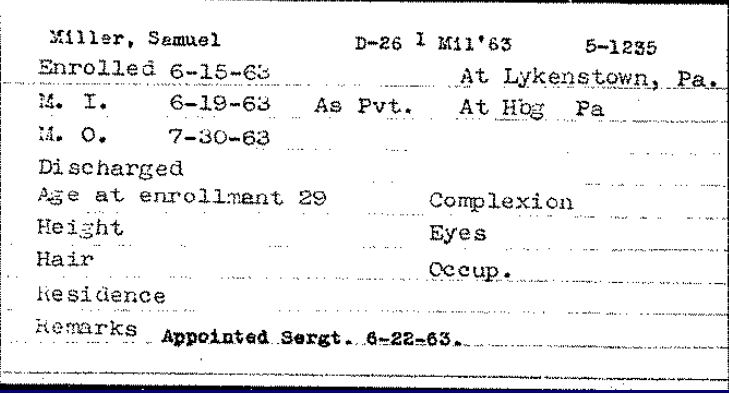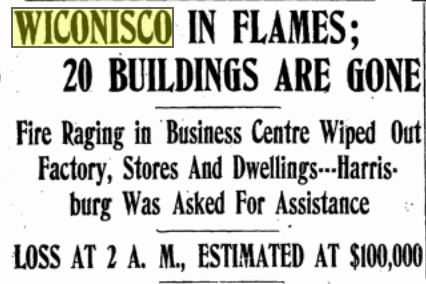Samuel Miller, Emergency Man & the Fire That Destroyed His General Store
Posted By Norman Gasbarro on March 1, 2017
Samuel Miller‘s name appears on the Lykens G.A.R. Monument as a man who served in the Civil War at the rank of Sergeant, but was not a member of the Heilner Post at that place.
Samuel Miller was born in 1833 in Pennsylvania. During the Civil War, he served in the 26th Pennsylvania Infantry (Emergency of 1863), Company D, as a Private, enrolling at Lykens, Dauphin County, on 15 June 1863. H was mustered into service four days later, and three days after that he was appointed Sergeant of the company. This emergency militia regiment is credited with service at Gettysburg, and the name of Samuel Miller appears on the Pennsylvania Memorial.
Samuel Miller was discharged on 30 July 1863 at the end of the emergency.
The only personal information about him in the military record was his age. He claimed to be 29.
No other military service was located for this Samuel Miller.
In both 1880 and 1900, Samuel Miller lived in Wiconisco, and gave his occupation as merchant, general store.
According to information on Findagrave, Samuel Miller died in 1904 and is buried at the Calvary United Methodist Church Cemetery, Wiconisco, Dauphin County, Pennsylvania. However, at this writing, nothing is mentioned on the Findagrave Memorial about his Civil War service.
In searching for his obituary in the Harrisburg newspapers, the following was found in the 28 September 1904 issue of the Harrisburg Patriot:
WICONISCO IN FLAMES
20 BUILDINGS ARE GONE
Fire Raging in Business Centre Wiped Out Factory, Stores and Dwellings
Harrisburg Was Asked for Assistance
LOSS AT 2 A.M. ESTIMATED AT $100,000
Special Despatch to The Patriot
Lykens, 28 September 1904, 2 a.m. – A fire which is still raging has up to this time destroyed thirteen buildings on the busiest portion of Pottsville Street, Wiconisco‘s most important thoroughfare, and eight barns and stables at the rear of the buildings.
Among the structures destroyed the most important are: Shaeffer’s hosiery mill, where the flames started; general store of the Samuel Miller estate; general store of Kimmel & Company; the Abraham Dreibilias block of flats and store rooms; a row of dwellings of Mrs. Margaret Mowrey; and other individual dwellings and store buildings.
The total loss to the present time is roughly estimate at $100,000. The flames are now being combatted on the south side of the street to prevent their taking hold of Henry Tontius‘ large hotel.
Four fire companies, one each from Wiconisco, Lykens, Williamstown and Tower City, are battling with the flames and unless the wind, which is now blowing back over the burned district, shifts again, the firemen think that they can prevent further spread.
There are no steam fire engines on the scene.
Word has been sent to the Mayor of Harrisburg asking for assistance and he has replied that one steam fire engine and a hose carriage have been placed on a flat car. He was asked to hold them in Harrisburg until further notice, pending the possibility of the local firemen being able to stop the spread of the fire in view of the favorable change in the wind.
All of the building that were destroyed were of frame and well seasoned and fell easy prey to the flames. As practically all the buildings in the town are of the same material there is the possibility that the fire may not yet be under control.
At five minutes of nine o’clock last evening a boy saw a bright light in the basement of the big four-story hosiery mill, owned by W. H. Shaeffer, of Philadelphia. He suspected the presence of fire and he had hardly given the alarm when the entire cellar seemed to be filled with flames.
There were several large oil tanks in the basement and almost immediately they took fire and then it was known that the building was doomed, though no one suspected that the flames would spread so far beyond.
Thus, shortly after his death, Samuel Miller‘s life’s work went up in flames. It is not known at this time how much of the loss was covered by insurance, but with the loss of the business, not much could have been left for his heirs.
 ;
;






Comments